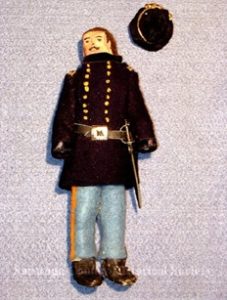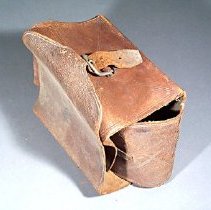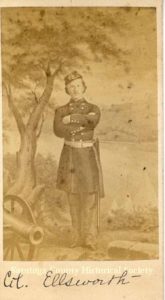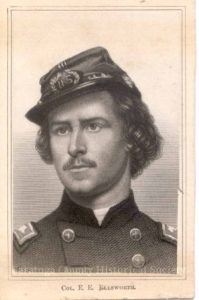The American Civil War is one of the bloodiest conflicts in human history, affecting everyone in the United States, including those right here in Ballston Spa and Saratoga County. The house containing the Brookside Museum was actually a military academy during the Civil War. The war entered nearly every aspect of a person’s life, inspiring the creation of toys, artwork, and stories of brave soldiers doing heroic deeds.
One particularly heroic individual was Colonel Elmer Ellsworth of the 11th New York “Fire Zouaves” Volunteer regiment. Ellsworth was born in 1837 right here in Saratoga County, in the town of Malta and was raised in Mechanicville. He spent much of his life in Chicago, Illinois, studying law and commanding National Guard cadets. While studying law, he became close friends with Abraham Lincoln and worked for him at his law firm.
When the Civil War broke out in 1861, Elmer moved to New York City where he raised a new regiment, the 11th New York Volunteers, mostly formed from various members of the fire service. Ellsworth had a particular infatuation with the Zouaves, a French light infantry regiment stationed in North Africa known for their outlandish uniform consisting of baggy trousers, blue jackets, and red caps. As such, Ellsworth modeled his regiment after the Zouaves by giving them a similar uniform and training them in tactics reminiscent to the French soldiers, giving them the nickname of the “Fire Zouaves”.
On May 24th, 1861, Ellsworth and his troops entered Alexandria, Virginia, to assist in the occupation of the city and to restore it to the Union. Unfortunately for Ellsworth, his first military engagement would be his last.
At first, it seemed as if occupying the city would be a simple task. The local population put up no resistance to the Union Soldiers. Colonel Ellsworth was almost disappointed at the lack of fighting. It was then that he came across the Marshall house, an inn in Alexandria. On top of the house billowing in the wind was a large Confederate flag. This had been a blemish on his old friend Lincoln’s view from the White House. He often complained that he could see it waving in the wind with his spyglass. If there was any chance at a fight, this would be one. Hopefully it would make this job a little bit more exciting.
“Corporal Brownell!”, bellowed the Colonel, “Bring your men over here and let’s take down that flag.”
“Yes sir”, replied Corporal Brownell as he motioned for his men to follow him. Brownell was from Troy, New York, a town not far away from Ellsworth’s home town of Malta, so Ellsworth knew he was a good man.
Ellsworth, accompanied by four of his troopers, entered through the doors of the Marshall house, where a disheveled, middle aged man with long brown hair and a goatee stood.
“You! You own this house?” shouted Ellsworth in an effort to intimidate him.
“N-no sir, I’m just a boarder here! Please don’t kill me!” the man begged, staring at the mouth of Corporal Brownell’s weapon.
“He’s fine Corporal, lower your rifle. What’s the flag doing up here on the top?”
“That’s the owner’s, James W. Jackson. Big supporter of the confederacy. Always said he’d kill the man who took his flag down.”
“Alright, Corporal! Search the house for anyone else. I’m going to go take down this flag. You’re free to leave, Sir. Sorry for the inconvenience.” Ellsworth marched upstairs as his men searched the various rooms of the building looking for this James Jackson. Ellsworth had heard of this man. He was notorious for abusing his slaves and was an ardent supporter of the Confederacy.
Ellsworth got to the roof of the house and saw the flag hanging there. He took out his knife, cut the rope holding the flag and draped the flag around his shoulders. He looked out across the city seeing his men and others marching through the streets, going over the various houses looking for signs of resistance. Below him, he watched a soldier going up to the Marshall house and taking the “O” off the sign to keep as a souvenir, maybe hoping that the owner would come out to attack him. It seemed as if even his men were searching for a fight. Such a shame that they couldn’t find Mr. Jackson. Nevertheless, Ellsworth could rest easy knowing that Lincoln’s line of sight was now free of that hideous disfigurement.
Ellsworth walked downstairs. When he got to the final few steps, he saw the disheveled man from earlier. Only this time he was armed with a double barrelled shotgun. A loud blast rang out in the house followed soon after by a smaller one from the corporal’s rifle. Elsworth was thrown to the ground with a mighty thud, the red blood pouring out of the wound in his chest staining his jacket. He now knew how foolish he had been. The disheveled man with long brown hair and a goatee, now lying fatally wounded by Corporal Brownell, was actually James W. Jackson, the notorious slave abuser. Ellsworth came in looking for a fight and he got it alright.
Elmer Ellsworth was the first Union casualty in the American Civil War and became a symbol for the Union Army. ‘Remember Ellsworth’ became a popular rallying cry for many recruitment officers. Corporal Brownell was awarded the Medal of Honor for his actions of killing James Jackson before he could kill any more Union soldiers. Abraham Lincoln was devastated to learn of the death of his friend, and made sure that his remains were dealt with in a respectful manner as befitting an American hero. He ordered his Honor guard to place his dear friend’s remains in the East Room of the White House where they rested for several days. Elmer Ellsworth was finally laid to rest in Mechanicville, New York, where he lays today.




















